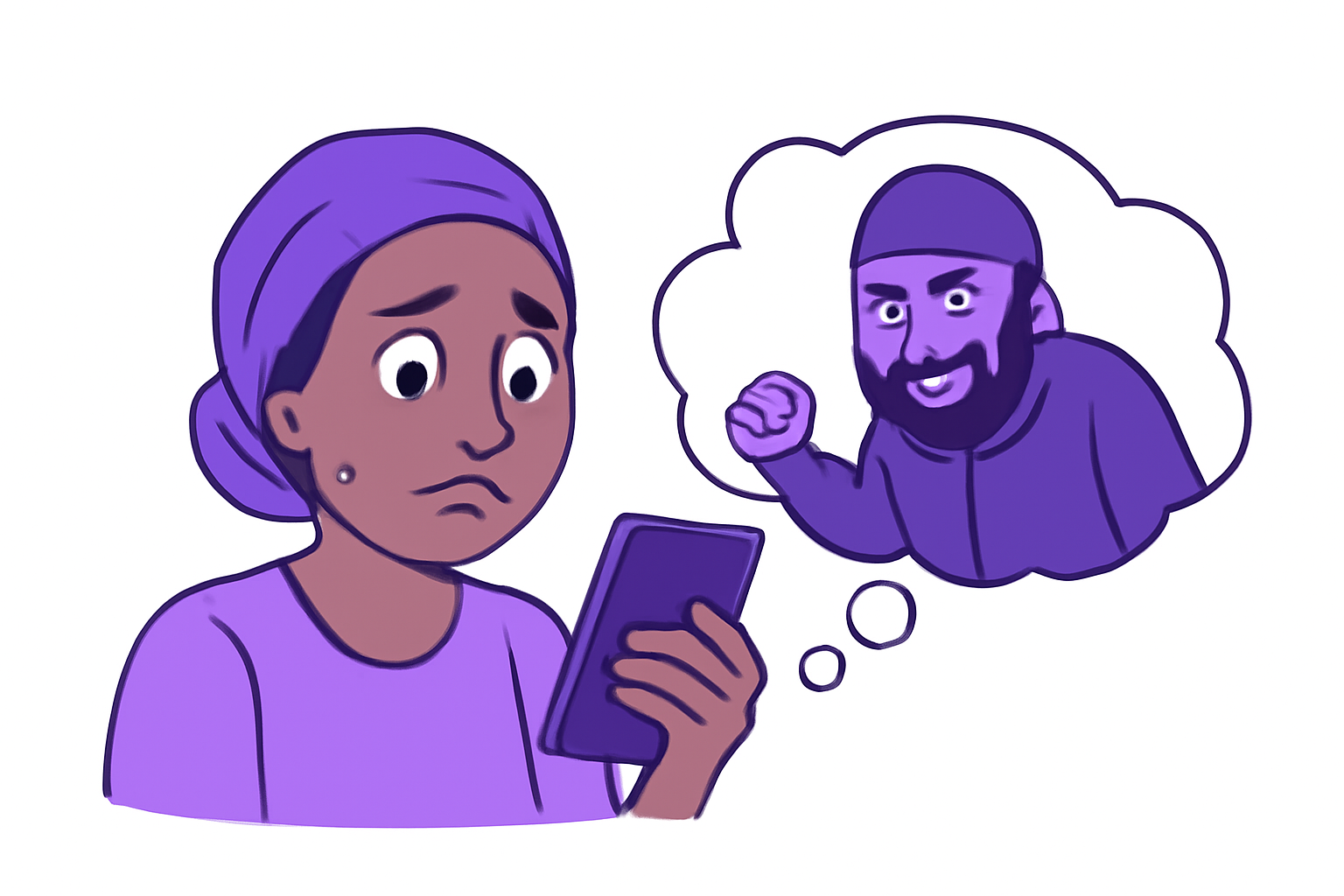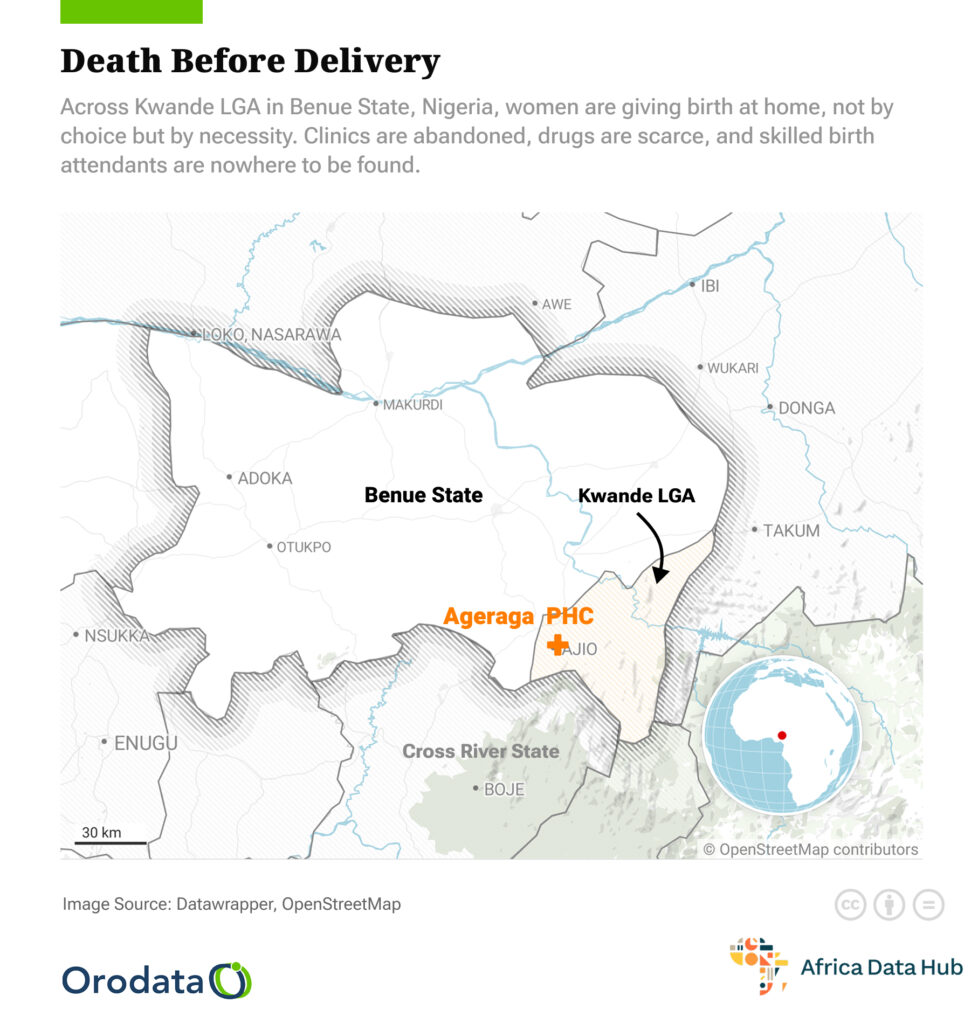In Kwara State, Nigeria, the tragic case of Hafsoh Lawal exposes the deadly consequences of technology-facilitated gender-based violence. What began as an online connection quickly turned into a brutal reality, highlighting the urgent need to address this growing crisis in the digital age.
By: Sanni Alausa-Issa
On February 14, 2025, four days after Hafsoh Lawal was declared missing in Ilorin, Kwara State, a dismembered body was found. It was hers. She was 23.
Four days prior, Hafsoh had vanished after attending a friend’s naming ceremony, never to return home. Her frantic family alerted authorities, triggering an urgent search. The digital trail from Hafsoh’s phone had led investigators to a house in Ilorin’s Offa Garage area, uncovering the unimaginable: Hafsoh’s dismembered remains concealed grotesquely in a bowl.
The ring, once a simple token of youthful identity, had now become an emblem of unspeakable horror. It was all her father, Ibrahim Lawal, had left to confirm the unimaginable loss. The cold metal shone harshly beneath the stark lights, silently narrating the final, devastating chapter of Hafsoh’s story.
Outside, beyond the fluorescent glare, Nigeria moves on unaware, like a nation indifferent or numb to the quiet epidemic that has stolen another daughter. This is a chilling echo of a growing crisis, a hidden pattern connecting online encounters to offline atrocities. Hafsoh Lawal was on the cusp of life, of dreams, of infinite possibilities. Her story must not vanish quietly. It demands to be heard, felt, and understood.
Hafsoh Lawal and the Rise of Technology-Facilitated Gender-Based Violence in Kwara State
February 10, 2025, seemed like any other day for Hafsoh Lawal, a 23-year-old student at Kwara State College of Education, Ilorin. Active, sociable, and digitally engaged, Hafsoh’s world, like many young Nigerians’, spanned both physical and virtual spaces. It was through social media that she first encountered Abdulrahman Bello, a 29-year-old self-acclaimed Islamic cleric whose charismatic online persona masked darker intentions.
Trusting and hopeful, Hafsoh accepted Bello’s invitation to visit his home in Ilorin’s Offa Garage area, a seemingly innocuous decision that would swiftly unravel into tragedy. When she didn’t return home that evening, anxiety quickly gripped her family, prompting a frantic search. Four agonising days later, technology — ironically, the tool used to lure her — became pivotal in uncovering her fate.
Investigators tracked Hafsoh’s phone signal, leading them directly to Bello’s residence. What they found there was unspeakable. Hafsoh’s body, brutally dismembered, was concealed in a bowl. Bello, initially feigning innocence, claimed Hafsoh died from an asthma attack, a hollow excuse contradicted violently by the physical evidence.
RELATED STORIES
Kwara Poly Top Official Diverted Millions of Naira in Students’ Funds to Personal Accounts
INVESTIGATION: How Negligence Crumbles Kwara Court Facilities; FOI Law Breaches Identified
In Kwara, A Multi-million Naira Milk Processing Plant Turned A Chicken Outlet
Forensic examinations and autopsy reports soon shattered any illusion of accidental death, revealing horrific details. Rape, dismemberment, and a chilling intent of ritualistic purposes. The gravity of these revelations sent shockwaves throughout Kwara State and beyond.
Bello, now facing charges including murder, rape, unlawful possession of human parts, and conspiracy alongside four accomplices including Ahmed Abdulwasiu, Suleiman Muhydeen, Jamiu Uthman, and AbdulRahman Jamiu became a stark embodiment of the menace lurking behind screens, exploiting digital anonymity to commit heinous acts.
As court proceedings unfold under the scrutiny of the Nigerian public, Hafsoh’s tragic end serves as a reminder that digital spaces, while connecting us, also harbour predators. It begs the question that in our hyper-connected age, how safe are our daughters truly? This brutal narrative demands introspection and justice, not only for Hafsoh but for countless others trapped in the sinister shadow of tech-facilitated gender-based violence.
The Growing Threat of Technology-Facilitated Gender-Based Violence Across Nigeria
Hafsoh’s devastating story is not isolated. Across Nigeria, technology-facilitated gender-based violence (TFGBV) has tragically evolved from digital harassment to brutal real-world violence. Several cases reveal this terrifying trajectory, each with grim parallels and harrowing outcomes.
In 2021, Iniubong Umoren, a vibrant 26-year-old graduate awaiting her National Youth Service posting, responded to a job offer on Twitter. Her quest for employment quickly turned deadly when Uduak Frank Akpan lured, raped, and murdered her, burying her body in a shallow grave. Iniubong’s last distressing audio message to a friend ignited a desperate social media campaign, bringing national attention to the hidden dangers lurking online. Akpan was eventually sentenced to death, but the question lingered. How many Iniubongs remain unnoticed, lost within the digital shadows?
RELATED STORIES
Kwara Poly Top Official Diverted Millions of Naira in Students’ Funds to Personal Accounts
INVESTIGATION: How Negligence Crumbles Kwara Court Facilities; FOI Law Breaches Identified
In Kwara, A Multi-million Naira Milk Processing Plant Turned A Chicken Outlet
Two years later, the nation recoiled again when Augusta Osedion, a promising first-class student, was brutally murdered by her boyfriend Benjamin Best Nnanyereugo, known online as ‘KillaBoi’. Following a heated argument, he stabbed Augusta to death, fled the country, and audaciously confessed on Instagram.
These are not isolated incidents but a disturbing trend of digital encounters spiralling into offline brutality. Each story shares a common thread. An initial contact through social media, grooming and trust-building, swiftly escalating to violent ends. The victims, often young women chasing dreams, friendships, or love, find themselves ensnared in a sinister trap set behind screens.
This pipeline from digital engagement to femicide demands urgent attention, accountability, and systemic change. The question isn’t merely how these tragedies happen, but why society remains passive, witnessing the mounting body count without enacting lasting solutions. Hafsoh, Iniubong, Augusta, these names must not merely be mourned; they must ignite a reckoning that transforms digital spaces from hunting grounds into safe havens.
Breaking the Silence: Confronting Technology-Facilitated Gender-Based Violence in Nigeria
Beyond the courtroom walls and police investigations, another narrative quietly shapes Nigeria’s response to femicide and gender-based violence — the stories society tells itself. Hafsoh Lawal’s case reveals a troubling pattern of religious condemnations, cultural rationalisations, and public silence, all contributing to a harmful narrative that shifts blame, dilutes accountability, and impedes meaningful change.
Following Hafsoh’s murder, influential religious leaders swiftly condemned the act. Prominent Islamic authorities in Kwara State denounced the violence unequivocally, stating that true religious teachings vehemently oppose such atrocities. Alongside these essential condemnations emerged subtle but damaging moral judgments. Discussions often veered towards questioning Hafsoh’s personal choices, particularly her decision to meet someone from social media, subtly implying negligence or complicity on her part.
This victim-blaming extends beyond religious forums into broader cultural narratives, reinforcing harmful stereotypes about women’s autonomy. Pervasive attitudes suggest women bear responsibility for avoiding violence rather than emphasizing the obligation to create safe environments. Statements urging parents to “protect” their daughters from online encounters inadvertently amplify victim responsibility rather than addressing the predatory actions and systemic failures facilitating such violence.
RELATED STORIES
Kwara Poly Top Official Diverted Millions of Naira in Students’ Funds to Personal Accounts
INVESTIGATION: How Negligence Crumbles Kwara Court Facilities; FOI Law Breaches Identified
In Kwara, A Multi-million Naira Milk Processing Plant Turned A Chicken Outlet
The alleged ritualistic element in Hafsoh’s murder further complicated public perception. While mainstream religious groups distanced themselves from such practices, sensationalist framing around “ritual killings” shifted the discourse away from gender-based violence towards sensationalised narratives of deviancy and superstition. Consequently, the gendered aspect of the violence was obscured, diminishing the recognition of femicide as a pressing societal crisis.
Moreover, a pervasive “culture of silence” further entrenches these harmful norms. Communities often prefer internal resolution, fearing stigma or shame, unintentionally shielding perpetrators and abandoning victims to isolation and injustice. This silence perpetuates impunity and discourages survivors from speaking out, thereby reinforcing a cycle of violence and silence.
These harmful narratives — victim-blaming, cultural rationalisation, sensationalism, and silence — undermine progress. It is a story Nigeria repeatedly tells itself, inadvertently normalising violence and hindering critical societal introspection and reform. To truly address the crisis of gender-based violence, Nigeria must confront and dismantle these damaging narratives, shifting from blame and silence towards accountability, justice, and systemic change.
A Call for Justice and Reform in Kwara State
Back in the quiet streets of Ilorin, the echoes of Hafsoh Lawal’s name reverberate, a persistent, haunting reminder of a tragedy that refuses to fade silently into history.
Despite widespread outrage, genuine change remains elusive. The headlines and hashtags fade, replaced by new tragedies, new victims, new names added to a lengthening list. Regardless, Hafsoh’s story holds a quiet power, compelling society to confront uncomfortable truths about safety, justice, and the insidious nature of digital violence. Her story challenges Nigeria to recognise that the horrors inflicted upon Hafsoh and countless others are symptoms of a deeper, systemic illness.
It is not enough to mourn Hafsoh. Her story demands more than passive remembrance; it urgently calls for action. The digital realm, a place of endless promise and peril, must be reclaimed as a space of safety, accountability, and dignity.
Nigeria must respond not with silence or resignation but with determination and tangible change. Only then can Hafsoh’s name echo as a catalyst for transformation.
End Credit:
This report is produced by Brain Builders Youth Development Initiative, and it is authored by its communications Director, Sanni Alausa-Issa



